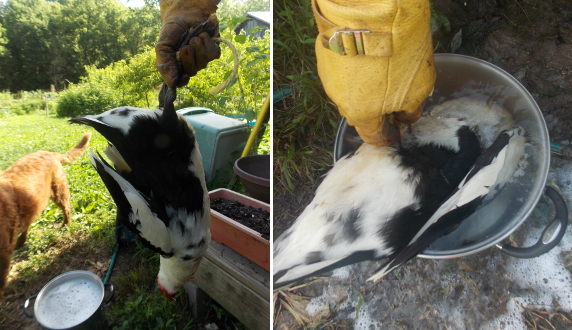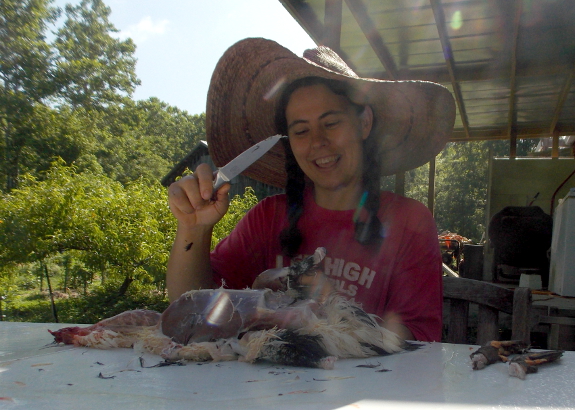
Pluck a duck

Storey's Guide to Raising Ducks reports that "ducklings are normally in
full feather for only 5 to 10 days sometime between six and a half and
ten weeks of age.... Shortly after achieving full feather, young ducks
go into a molt.... If ducklings are not dressed before this molt
commences, they will not be in full feather again for approximately 6 to
10 weeks." I didn't take the admonition very seriously since I've
plucked chickens who had lots of pin feathers and never had a problem, but I soon found that the report that ducks are more difficult to pluck than chickens was an understatement!

When the time came to try our hand at duck slaughtering,
Mark and I added some dish detergent to the scalding water and roughed
up the feathers a lot with a spoon while dunking the bird up and down in
hopes of getting water through the feathers so it would reach the
skin. Despite that extra attention, though, plucking tested even
my patience (and I hand-weed our quarter-acre garden mostly by myself
each year). So I ended up skinning the duck, which means we lost
that pastured fat (and even skinning wasn't easy). Final weight of
the cleaned carcass (sans skin) for the 10-week-old duck was 1.9
pounds.
The ducks started their
molt a week or two ago, so we'd need to wait until August or September
to slaughter if we want an easier job plucking. But I wonder how
much easier it would be at that time, since even the big feathers on our
trial duck were awfully hard to pull. I'd be curious to hear from
others who have raised ducks for meat. Do you pluck, or did you
throw in the towel and skin?
Want more in-depth information? Browse through our books.
Or explore more posts by date or by subject.
About us: Anna Hess and Mark Hamilton spent over a decade living self-sufficiently in the mountains of Virginia before moving north to start over from scratch in the foothills of Ohio. They've experimented with permaculture, no-till gardening, trailersteading, home-based microbusinesses and much more, writing about their adventures in both blogs and books.
Want to be notified when new comments are posted on this page? Click on the RSS button after you add a comment to subscribe to the comment feed, or simply check the box beside "email replies to me" while writing your comment.

I took a poultry class about a year ago from Farmstead Meatsmith. I took the class specifically for the duck experience. We butchered a dozen ducks and a few roosters. The key he taught was scalding. He was very particular about water temperature and had a basic 'meat' thermometer that he used to try to keep the water temp at 150 degrees (not more, but he would do a few ducks before checking again, so maybe it went down to 145 at times.) And for chickens and non-waterfowl, we vigorously dunked and swished for exactly 1 minute. For the ducks, we dunked and vigorously swished for exactly 2 minutes. We did time it. And it was a generous sized pot and some very vigorous up and down dunking and swishing to ensure the water really penetrated. We didn't add any detergent or anything to the water. The plucking went really well.
My take aways: -150 degree water (good size pot) -2 minute scald -VERY vigorous dunking and swishing (good gloves because there was a lot of splashing of scalding water)
I know your pain. A farm I used to work at did pastured chickens and pastured ducks. The plucker worked great for the chickens, not so much on the ducks. It took about 30 minutes per duck to pluck. Later I learned about waxing ducks. YouTube it. Basically the duck is scalded, plucked, then dipped in hot wax. Then dipped in ice water. You wind up with a hard wax covered duck. But crack the wax and the little pin feathers come off with the wax. The wax is reusable.
I haven't done this yet, I don't raise ducks specifically because of that plucking nightmare. But someday I will try this. Enjoy eating your ducks.
https://www.youtube.com/watch?v=VFtVqBKjWFs youtube is a great informational resource. How did the Brine work for you???? Darryl
I scald in 65 C (150 F) water, but don't time it. Just dunk and agitate (pull them up and down by the legs, so the feathers swoosh outwards on the up-stroke and the water gets in to the skin), until a wing feather slips straight out when pulled gently.
The timing varies with the type, age and size of duck, so this is the only reliable way I've found.
I then pluck the extremities (wings, then legs, then neck) first, since they cool down fastest. Then I do the tail, and work my way up the body.
Because I don't time my slaughter with moulting/feather growth, I usually end up with lots of little pin feathers and hairs. A blowtorch is handy to burn these off, but be careful not to cook the skin!
When processing older ducks, I find skinning them to be much easier. They're going to be tough anyway, so I'm not going to be cooking them with the skin on. Usually they get minced, finely chopped, or slow-cooked and pulled.
For meat, though, I find chickens much easier and more rewarding. Rabbits are another level of easier again!